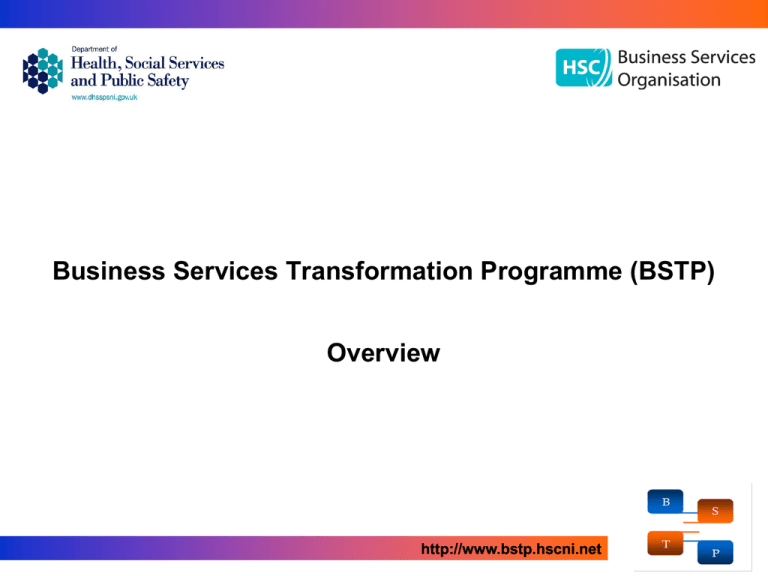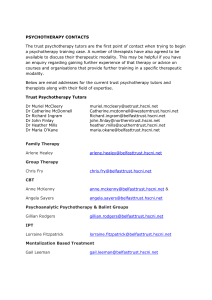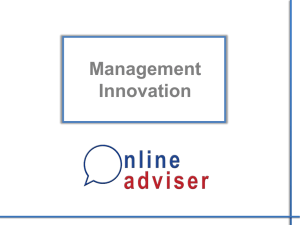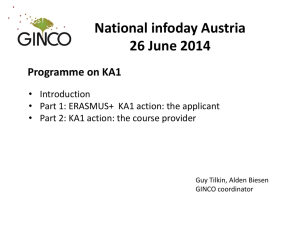BSTP - Business Services Transformation Programme
advertisement

Business Services Transformation Programme (BSTP) Overview http://www.bstp.hscni.net Discussion areas Vision of change BSTP Objectives HSC organisation benefits Governance Implementation structure Programme Overview What is changing? What will change for me? Managers Staff ICT implementation Overview: FPL Overview : HRPTS Training/support Further information http://www.bstp.hscni.net Vision for Change To procure business systems to support the modernisation of the HSC and to deliver customer focussed Shared Services http://www.bstp.hscni.net Objectives of the BSTP 1. To procure and implement new business systems for Finance, Procurement and Logistics, (FPL), Human Resources Payroll, Travel & Subsistence (HRPTS) and Family Practitioner Payments and Information Systems and Services 2. Deliver economic and qualitative benefits to release resources to frontline care and to enhance management in HSC 3. Complete development and implementation of Shared Services in the HSC http://www.bstp.hscni.net HSC Organisation benefits • Financial benefits with agreed financial measurements Delivering financial savings for release into frontline services Efficiency targets • Non financial benefits Clear, visible links for staff of their contribution to organisational objectives Supports wider business transformation, and the efficiency / effectiveness of service delivery through the right people, right job, right skills Improved accuracy of workforce information leading to better workforce control Employee self service – access to specific information Faster transactions through automation Standardised working across organisations, allowing for increased collaboration http://www.bstp.hscni.net Governance http://www.bstp.hscni.net Implementation – New Systems Procuring and implementation of new HR, Payroll, Travel & Subsistence Systems Work Packages Procuring and implementation of new Finance, Procurement & Logistics Systems Driven centrally Lead Led centrally regionally Managing the implementation of the new HRPTS and FPL systems and the transformational change within organisations Implemented locally BSO NIAS Belfast Northern South Eastern Southern Western http://www.bstp.hscni.net What is Changing? • Replacement of multiple systems - HRMS, TAS, income / payments, GL, Recruit & Monitor – to 2 systems HRPTS and FPL • Manager and Employee Self Service • Access to “Just In Time” information from 24/7, 365 system • Standardised, streamlined and more automated administrative processes, enabling more efficient working • A more clearly defined Organisation framework, with clear lines of authority and automated approval workflows http://www.bstp.hscni.net Business areas impacted HRPTS • Workforce Information, Planning and Monitoring • Employee Relations • Recruitment and Selection • Learning and Development • Payroll • Travel and Subsistence FPL • Accounts Receivable • Accounts Payable • Cash Management • General Ledger • Budgeting • Procurement • Logistics http://www.bstp.hscni.net The 5 big Change impacts to Self Self Move service will Service Self service will enable Line Managers and Employees to input information directly onto the system. Role of the Line Manager Changes will enable managers access important Management Information directly- Dashboard Reports Role of HR / Finance/PaLs Opportunity to deliver new ways of working for HR, Finance , Pals, Staff Clear definition of responsibilities There will be clarity on who is responsible for approving automated transactions, financial & Non-financial Role of ICT in day to day working Automated processes means that ICT play an important role in day to day activities. Move away from paper based transactions http://www.bstp.hscni.net What will it look like? The new system will operate on three main levels; HR, Finance, Payroll, PaLs as core users Manager Self Service (MSS) Employee Self Service (ESS) • employees will be able to personally action some transactions such as a change of address, without the need for a manual form to be completed by line management and forwarded to HR as the case currently http://www.bstp.hscni.net What does it mean for you? Manager Self Service (MSS) • Paperless system for many processes which may include change of hours, training enrolment, change of personal details, approving A/L • Ability to report on key performance areas e.g. absence, training compliance • Local Reports - Can produce reports at a local level - ability to access real time information when required 24 /7 365 • Ability for more effective workforce planning • Full integration between HR and payroll functionality for payment of calculated entitlements Contains all the core employee information used by other components of the system, eliminates multiple data entry that is prone to error and causes much time to be wasted Automatic messaging prompts and support mechanisms to complete administrative tasks more quickly and easily http://www.bstp.hscni.net Example 1. Processing a staff leaver • Different categories of leaver can be processed through either ESS, MSS or will require direct HR authorisation to proceed Method of Leaving . How will this be actioned? Employee initiates their resignation on ESS 1) If an employee has handed in their notice and wishes to resign from their post When this is ‘approved’ by a manager it will automatically go through to payroll 2) If a manager wishes to terminate someone e.g. at end of their temporary contract (having followed statutory procedures) Manager initiates on MSS and will go straight through to payroll. 3) If an employee who is leaving as part of a pensionable retirement/voluntary redundancy arrangement Will need to be actioned by HR as a core user. http://www.bstp.hscni.net What does it mean for you? ESS Employee Self Service • Allows staff to access personal information and carry out simple transactions – Apply for Annual Leave – Apply for Transfer and Promotion – Submit a timesheet – Better control of personal data (changes to personal records e.g. bank details and home address) and business activities that affect your role http://www.bstp.hscni.net What will Self Service Look Like? http://www.bstp.hscni.net Level 3 – Section Navigation http://www.bstp.hscni.net Level 4 – Sub Section Navigation http://www.bstp.hscni.net What will the FPL system look like? http://www.bstp.hscni.net Purchase Order Processing view http://www.bstp.hscni.net Basket Approval http://www.bstp.hscni.net ICT implications • • • • • • Automation Daily Log on What if I am off? Escalation rules etc Email accounts Access*** http://www.bstp.hscni.net FPL –Plan Designing Dec 11 Jan 12 Testing Mar 12 Feb 12 Apr 12 ATP1 May 12 Jun 12 Jul 12 ATP 2 Aug 12 Sep 12 Oct 12 Process Process design design ATP 3 Support ATP 4 Nov Dec Jan 12 Mar 12 13 Apr 13 Solution design Testing ICT Env Production Env User User Acceptance Acceptance Tests Tests Finance, Finance, Proc, Proc, Logistics Logistics ser ser acceptance acceptance testing testing ATP1 Logistics ,BSO Logistics ,BSO Logistics ,BSO ATP1 Logistics ,BSO ,, Trust Trust A A ATP1 ATP1 Logistics ,BSO ,, ATP1 ATP1 Logistics ,BSO regional Trust C Trust regional Trust B B & &C Trust D D& & EE Change Change Approach Approach Create/Update Create/Update and and execute execute change change action action plan plan Change Change Impact Impact Assessment Assessment Organisation Organisation Readiness Readiness assessment assessment Change Change agent agent Network Network mobilised mobilised TRA TRA Day Day 1 1 sent sent to to Trusts Trusts Organisation Organisation readiness survey survey readiness Organisation Organisation Readiness Readiness assessment assessment Organisation Organisation Readiness Readiness assessment assessment Organisation Organisation readiness survey survey readiness Organisation Organisation readiness survey survey readiness TRA TRA Pre-development Pre-development requirements requirements and and course scheduling course scheduling Written Written material material development, development, e e learning learning scripts scripts Develop Develop Material Material TtT TtT learning learning completion & completion & course course delivery delivery Communication and Stakeholder Engagement/Manage and Support Change Agent \network GO LIVE ATP4 ATP4 FPL Activities • User Acceptance Testing 26 March -11 May at ATP • ABS Sign off UAT 22 May • Training Requirements Analysis , April – end June • ABS implementation of final hardware and software • Local connectivity, capacity and volume testing, June • Planning for Training • Planning for Go-Live • Contribute to Change Impact Assessment • Issue Supplier Questionnaire • Resolve Voice Picking Issue • Finalise Coding • Review Data Warehousing options • Contribute to Integration meetings http://www.bstp.hscni.net HRPTS –Plan Blueprint Realisation Dec 11 Process Validation Jan 12 Mar 12 Feb 12 Apr 12 Final Prep & Go-Live May 12 Jun 12 Jul 12 Aug 12 Sep 12 Support Nov 12 Oct 12 Design Customising & Unit Test Portal Design Portal Approach Interface & Enhancements Specs Interface & Enhancements Development & Unit Test Pre-System testing Portal Build BI Spec & build Develop Content Data App Build & Unit Test Data load routines Load Load Mock load 1 & 2 Data extraction, template load, Cleansing PP2 Data PP1 UAT Data PP Prep Change Approach Data Develop test scripts ST2 Data ST1 Dev. test scenarios Data Testing App PP3 Desktop roll-out (SAP GUI, Internet explorer etc) Training Approach TCO TtT TNA/ Course catalogue Develop Material http://www.bstp.hscni.net CO User Training GO LIVE HRPTS Activities Activities planned in Realisation Phase •Data Migration •Test Scenarios (UAT) •Change Impact Analysis •Organisation readiness assessment •Training Needs Analysis •Training Material •Training Delivery •Desktop Rollout •Support arrangements Final Prep and cutover •Training will be provided including classroom training, support and guidance •From the outset we encourage staff to check with the line manager . http://www.bstp.hscni.net What will change for me? Stop, start and continue example No longer use an Annual Leave Card to book holidays Stopping Book leave online Starting Discuss suitable leave dates with your Line Manager Continuing http://www.bstp.hscni.net What training/support will there be? Training and support will be available to everyone impacted to ensure Staff are equipped with the operational skills and knowledge to undertake the new ways of working required by new systems Know how to get help when they need it Line managers will be equipped with the operational skills and knowledge to enter and approve/reject time, claimable allowances, absence (including leave and sickness) and job related data changes as required. This includes recognition that different line managers will perform different roles in the process, and this may include an approval role Permission levels are currently being clarified as part of detailed design and these will be integrated as appropriate into the business change interventions Staff will be taught about the new systems and processes which BSTP will introduce and invited to training courses based on their role. Information on new ways of working and be provided with materials and guidance packs available online and on the portal Help will be available online, face-to-face and on the telephone Support will be available after go live. Face-to-face support will be provided by dedicated expert(s) in each impacted business area – they will be called ‘Floorwalkers’ One month after go live, Floorwalkers will return to their usual day jobs, but will continue to provide support in their secondary role as ‘Super Users’ http://www.bstp.hscni.net Further information/contacts Contacts – Trust Lead details http://www.bstp.hscni.net • Make this site your homepage • Read all about the programme • Get more information on projects • Benefit from weekly project updates • Read the inside track in the Programme Directors Blog, • Find out who is involved in your Trust and how you can get involved • Make a suggestion on how you’d like to be communicated with • Provide feedback on what’s working and help us improve how we deliver information http://www.bstp.hscni.net









